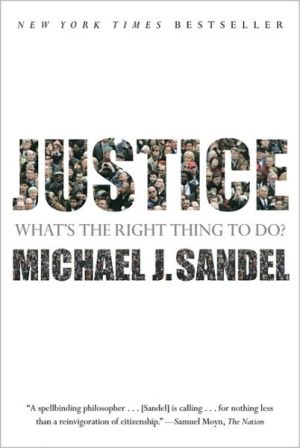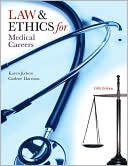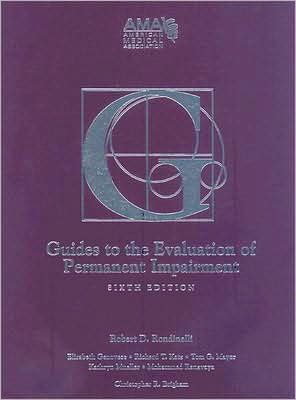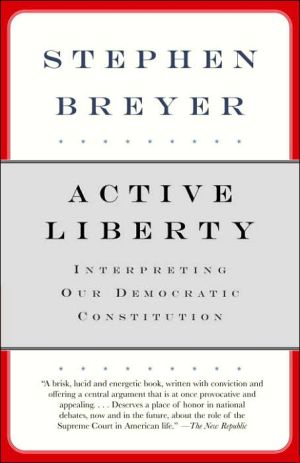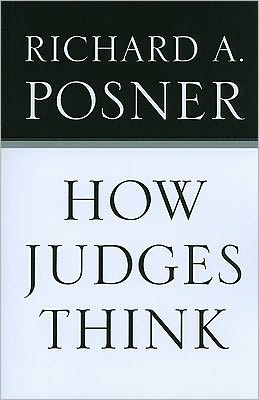Justice: What's the Right Thing to Do?
What are our obligations to others as people in a free society? Should government tax the rich to help the poor? Is the free market fair? Is it sometimes wrong to tell the truth? Is killing sometimes morally required? Is it possible, or desirable, to legislate morality? Do individual rights and the common good conflict?\ Michael J. Sandel’s “Justice” course is one of the most popular and influential at Harvard. Up to a thousand students pack the campus theater to hear Sandel relate the big...
Search in google:
Michael J. Sandel shows how a surer grasp of philosophy can help us to make sense of politics, morality, and our own convictions. The Barnes & Noble Review From time immemorial -- or at least since Spike Lee's 1989 movie Do the Right Thing -- men and women have asked, like the subtitle of Michael Sandel's book, "What's the right thing to do?" Every year a thousand or so Harvard undergraduates seeking an answer to this question sign up for Moral Reasoning 22: Justice, Professor Sandel's renowned introductory course and the most popular offering in that university's history. What they learn there is of some consequence for the rest of us. After all, the next most popular course at Harvard is Social Analysis 10: Principles of Economics, from which legions of students annually emerge, like former Harvard president (and economics professor) Lawrence Summers, utterly sure of themselves, contemptuous of moral reasoning, and primed to lead their country into the financial abyss. Unless "Justice" manages to infiltrate "Principles of Economics" -- and not only at Harvard -- America is likely to languish in moral and financial bankruptcy for a long time.
1. DOING THE RIGHT THING In the summer of 2004, Hurricane Charley roared out of the Gulf of Mexico and swept across Florida to the Atlantic Ocean. The storm claimed twenty-two lives and caused $11 billion in damage.1 It also left in its wake a debate about price gouging.\ At a gas station in Orlando, they were selling two-dollar bags of ice for ten dollars. Lacking power for refrigerators or air-conditioning in the middle of August, many people had little choice but to pay up. Downed trees heightened demand for chain saws and roof repairs. Contractors offered to clear two trees off a homeowner’s roof—for $23,000. Stores that normally sold small household generators for $250 were now asking $2,000. A seventy-seven-year-old woman fleeing the hurricane with her elderly husband and handicapped daughter was charged $160 per night for a motel room that normally goes for $40.2\ Many Floridians were angered by the inflated prices. “After Storm Come the Vultures,” read a headline in USA Today. One resident, told it would cost $10,500 to remove a fallen tree from his roof, said it was wrong for people to “try to capitalize on other people’s hardship and misery.” Charlie Crist, the state’s attorney general, agreed: “It is astounding to me, the level of greed that someone must have in their soul to be willing to take advantage of someone suffering in the wake of a hurricane.”3\ Florida has a law against price gouging, and in the aftermath of the hurricane, the attorney general’s office received more than two thousand complaints. Some led to successful lawsuits. A Days Inn in West Palm Beach had to pay $70,000 in penalties and restitution for overcharging customers.4\ But even as Crist set about enforcing the price-gouging law, some economists argued that the law—and the public outrage—were misconceived. In medieval times, philosophers and theologians believed that the exchange of goods should be governed by a “just price,” determined by tradition or the intrinsic value of things. But in market societies, the economists observed, prices are set by supply and demand. There is no such thing as a “just price.”\ Thomas Sowell, a free-market economist, called price gouging an “emotionally powerful but economically meaningless expression that most economists pay no attention to, because it seems too confused to bother with.” Writing in the Tampa Tribune, Sowell sought to explain “how ‘price gouging’ helps Floridians.” Charges of price gouging arise “when prices are significantly higher than what people have been used to,” Sowell wrote. But “the price levels that you happen to be used to” are not morally sacrosanct. They are no more “special or ‘fair’ than other prices” that market conditions—including those prompted by a hurricane—may bring about.5\ Higher prices for ice, bottled water, roof repairs, generators, and motel rooms have the advantage, Sowell argued, of limiting the use of such things by consumers and increasing incentives for suppliers in far-off places to provide the goods and ser vices most needed in the hurricane’s aftermath. If ice fetches ten dollars a bag when Floridians are facing power outages in the August heat, ice manufacturers will find it worth their while to produce and ship more of it. There is nothing unjust about these prices, Sowell explained; they simply reflect the value that buyers and sellers choose to place on the things they exchange.6\ Jeff Jacoby, a pro-market commentator writing in the Boston Globe, argued against price-gouging laws on similar grounds: “It isn’t gouging to charge what the market will bear. It isn’t greedy or brazen. It’s how goods and ser vices get allocated in a free society.” Jacoby acknowledged that the “price spikes are infuriating, especially to someone whose life has just been thrown into turmoil by a deadly storm.” But public anger is no justification for interfering with the free market. By providing incentives for suppliers to produce more of the needed goods, the seemingly exorbitant prices “do far more good than harm.” His conclusion: “Demonizing vendors won’t speed Florida’s recovery. Letting them go about their business will.”7\ Attorney General Crist (a Republican who would later be elected governor of Florida) published an op-ed piece in the Tampa paper defending the law against price gouging: “In times of emergency, government cannot remain on the sidelines while people are charged unconscionable prices as they flee for their lives or seek the basic commodities for their families after a hurricane.”8 Crist rejected the notion that these “unconscionable” prices reflected a truly free exchange:\ This is not the normal free market situation where willing buyers freely elect to enter into the marketplace and meet willing sellers, where a price is agreed upon based on supply and demand. In an emergency, buyers under duress have no freedom. Their purchases of necessities like safe lodging are forced.9\ The debate about price gouging that arose in the aftermath of Hurricane Charley raises hard questions of morality and law: Is it wrong for sellers of goods and ser vices to take advantage of a natural disaster by charging whatever the market will bear? If so, what, if anything, should the law do about it? Should the state prohibit price gouging, even if doing so interferes with the freedom of buyers and sellers to make whatever deals they choose?\ Welfare, Freedom, and Virtue These questions are not only about how individuals should treat one another. They are also about what the law should be, and about how society should be organized. They are questions about justice. To answer them, we have to explore the meaning of justice. In fact, we’ve already begun to do so. If you look closely at the price-gouging debate, you’ll notice that the arguments for and against price-gouging laws revolve around three ideas: maximizing welfare, respecting freedom, and promoting virtue. Each of these ideas points to a different way of thinking about justice.\ The standard case for unfettered markets rests on two claims—one about welfare, the other about freedom. First, markets promote the welfare of society as a whole by providing incentives for people to work hard supplying the goods that other people want. (In common parlance, we often equate welfare with economic prosperity, though welfare is a broader concept that can include noneconomic aspects of social well-being.) Second, markets respect individual freedom; rather than impose a certain value on goods and ser vices, markets let people choose for themselves what value to place on the things they exchange.\ Not surprisingly, the opponents of price-gouging laws invoke these two familiar arguments for free markets. How do defenders of price gouging laws respond? First, they argue that the welfare of society as whole is not really served by the exorbitant prices charged in hard times. Even if high prices call forth a greater supply of goods, this benefit has to be weighed against the burden such prices impose on those least able to afford them. For the affluent, paying inflated prices for a gallon of gas or a motel room in a storm may be an annoyance; but for those of modest means, such prices pose a genuine hardship, one that might lead them to stay in harm’s way rather than flee to safety. Proponents of price-gouging laws argue that any estimate of the general welfare must include the pain and suffering of those who may be priced out of basic necessities during an emergency.\ Second, defenders of price-gouging laws maintain that, under certain conditions, the free market is not truly free. As Crist points out, “buyers under duress have no freedom. Their purchases of necessities like safe lodging are forced.” If you’re fleeing a hurricane with your family, the exorbitant price you pay for gas or shelter is not really a voluntary exchange. It’s something closer to extortion. So to decide whether price-gouging laws are justified, we need to assess these competing accounts of welfare and of freedom.\ But we also need to consider one further argument. Much public support for price-gouging laws comes from something more visceral than welfare or freedom. People are outraged at “vultures” who prey on the desperation of others and want them punished—not rewarded with windfall profits. Such sentiments are often dismissed as atavistic emotions that should not interfere with public policy or law. As Jacoby writes, “demonizing vendors won’t speed Florida’s recovery.”10\ But the outrage at price-gougers is more than mindless anger. It gestures at a moral argument worth taking seriously. Outrage is the special kind of anger you feel when you believe that people are getting things they don’t deserve. Outrage of this kind is anger at injustice.\ Crist touched on the moral source of the outrage when he described the “greed that someone must have in their soul to be willing to take advantage of someone suffering in the wake of a hurricane.” He did not explicitly connect this observation to price-gouging laws. But implicit in his comment is something like the following argument, which might be called the virtue argument:\ Greed is a vice, a bad way of being, especially when it makes people oblivious to the suffering of others. More than a personal vice, it is at odds with civic virtue. In times of trouble, a good society pulls together. Rather than press for maximum advantage, people look out for one another. A society in which people exploit their neighbors for financial gain in times of crisis is not a good society. Excessive greed is therefore a vice that a good society should discourage if it can. Pricegouging laws cannot banish greed, but they can at least restrain its most brazen expression, and signal society’s disapproval of it. By punishing greedy behavior rather than rewarding it, society affirms the civic virtue of shared sacrifice for the common good.\ To acknowledge the moral force of the virtue argument is not to insist that it must always prevail over competing considerations. You might conclude, in some instances, that a hurricane-stricken community should make a devil’s bargain—allow price gouging in hopes of attracting an army of roofers and contractors from far and wide, even at the moral cost of sanctioning greed. Repair the roofs now and the social fabric later. What’s important to notice, however, is that the debate about price-gouging laws is not simply about welfare and freedom. It is also about virtue—about cultivating the attitudes and dispositions, the qualities of character, on which a good society depends.\ Some people, including many who support price-gouging laws, find the virtue argument discomfiting. The reason: It seems more judgmental than arguments that appeal to welfare and freedom. To ask whether a policy will speed economic recovery or spur economic growth does not involve judging people’s preferences. It assumes that everyone prefers more income rather than less, and it doesn’t pass judgment on how they spend their money. Similarly, to ask whether, under conditions of duress, people are actually free to choose doesn’t require evaluating their choices. The question is whether, or to what extent, people are free rather than coerced.\ The virtue argument, by contrast, rests on a judgment that greed is a vice that the state should discourage. But who is to judge what is virtue and what is vice? Don’t citizens of pluralist societies disagree about such things? And isn’t it dangerous to impose judgments about virtue through law? In the face of these worries, many people hold that government should be neutral on matters of virtue and vice; it should not try to cultivate good attitudes or discourage bad ones.\ So when we probe our reactions to price gouging, we find ourselves pulled in two directions: We are outraged when people get things they don’t deserve; greed that preys on human misery, we think, should be punished, not rewarded. And yet we worry when judgments about virtue find their way into law.\ This dilemma points to one of the great questions of political philosophy: Does a just society seek to promote the virtue of its citizens? Or should law be neutral toward competing conceptions of virtue, so that citizens can be free to choose for themselves the best way to live?\ According to the textbook account, this question divides ancient and modern political thought. In one important respect, the textbook is right. Aristotle teaches that justice means giving people what they deserve. And in order to determine who deserves what, we have to determine what virtues are worthy of honor and reward. Aristotle maintains that we can’t figure out what a just constitution is without first reflecting on the most desirable way of life. For him, law can’t be neutral on questions of the good life.\ By contrast, modern political philosophers—from Immanuel Kant in the eighteenth century to John Rawls in the twentieth century—argue that the principles of justice that define our rights should not rest on any particular conception of virtue, or of the best way to live. Instead, a just society respects each person’s freedom to choose his or her own conception of the good life.\ So you might say that ancient theories of justice start with virtue, while modern theories start with freedom. And in the chapters to come, we explore the strengths and weaknesses of each. But it’s worth noticing at the outset that this contrast can mislead.\ For if we turn our gaze to the arguments about justice that animate contemporary politics—not among philosophers but among ordinary men and women—we find a more complicated picture. It’s true that most of our arguments are about promoting prosperity and respecting individual freedom, at least on the surface. But underlying these arguments, and sometimes contending with them, we can often glimpse another set of convictions—about what virtues are worthy of honor and reward, and what way of life a good society should promote. Devoted though we are to prosperity and freedom, we can’t quite shake off the judgmental strand of justice. The conviction that justice involves virtue as well as choice runs deep. Thinking about justice seems inescapably to engage us in thinking about the best way to live.\ What Wounds Deserve the Purple Heart?\ On some issues, questions of virtue and honor are too obvious to deny. Consider the recent debate over who should qualify for the Purple Heart. Since 1932, the U.S. military has awarded the medal to soldiers wounded or killed in battle by enemy action. In addition to the honor, the medal entitles recipients to special privileges in veterans’ hospitals.\ Since the beginning of the current wars in Iraq and Afghanistan, growing numbers of veterans have been diagnosed with post-traumatic stress disorder and treated for the condition. Symptoms include recurring nightmares, severe depression, and suicide. At least three hundred thousand veterans reportedly suffer from traumatic stress or major depression. Advocates for these veterans have proposed that they, too, should qualify for the Purple Heart. Since psychological injuries can be at least as debilitating as physical ones, they argue, soldiers who suffer these wounds should receive the medal.11\ After a Pentagon advisory group studied the question, the Pentagon announced, in 2009, that the Purple Heart would be reserved for soldiers with physical injuries. Veterans suffering from mental disorders and psychological trauma would not be eligible, even though they qualify for government-supported medical treatment and disability payments. The Pentagon offered two reasons for its decision: traumatic stress disorders are not intentionally caused by enemy action, and they are difficult to diagnose objectively.12\ Did the Pentagon make the right decision? Taken by themselves, its reasons are unconvincing. In the Iraq War, one of the most common injuries recognized with the Purple Heart has been a punctured eardrum, caused by explosions at close range.13 But unlike bullets and bombs, such explosions are not a deliberate enemy tactic intended to injure or kill; they are (like traumatic stress) a damaging side effect of battlefield action. And while traumatic disorders may be more difficult to diagnose than a broken limb, the injury they inflict can be more severe and long-lasting.\ As the wider debate about the Purple Heart revealed, the real issue is about the meaning of the medal and the virtues it honors. What, then, are the relevant virtues? Unlike other military medals, the Purple Heart honors sacrifice, not bravery. It requires no heroic act, only an injury inflicted by the enemy. The question is what kind of injury should count.\ A veteran’s group called the Military Order of the Purple Heart opposed awarding the medal for psychological injuries, claiming that doing so would “debase” the honor. A spokesman for the group stated that “shedding blood” should be an essential qualification.14 He didn’t explain why bloodless injuries shouldn’t count. But Tyler E. Boudreau, a former Marine captain who favors including psychological injuries, offers a compelling analysis of the dispute. He attributes the opposition to a deep-seated attitude in the military that views post-traumatic stress as a kind of weakness. “The same culture that demands tough-mindedness also encourages skepticism toward the suggestion that the violence of war can hurt the healthiest of minds … Sadly, as long as our military culture bears at least a quiet contempt for the psychological wounds of war, it is unlikely those veterans will ever see a Purple Heart.”15\ So the debate over the Purple Heart is more than a medical or clinical dispute about how to determine the veracity of injury. At the heart of the disagreement are rival conceptions of moral character and military valor. Those who insist that only bleeding wounds should count believe that post-traumatic stress reflects a weakness of character unworthy of honor. Those who believe that psychological wounds should qualify argue that veterans suffering long-term trauma and severe depression have sacrificed for their country as surely, and as honorably, as those who’ve lost a limb.\ The dispute over the Purple Heart illustrates the moral logic of Aristotle’s theory of justice. We can’t determine who deserves a military medal without asking what virtues the medal properly honors. And to answer that question, we have to assess competing conceptions of character and sacrifice.\ It might be argued that military medals are a special case, a throwback to an ancient ethic of honor and virtue. These days, most of our arguments about justice are about how to distribute the fruits of prosperity, or the burdens of hard times, and how to define the basic rights of citizens. In these domains, considerations of welfare and freedom predominate. But arguments about the rights and wrongs of economic arrangements often lead us back to Aristotle’s question of what people morally deserve, and why.\ Bailout Outrage The public furor over the financial crisis of 2008–09 is a case in point. For years, stock prices and real estate values had climbed. The reckoning came when the housing bubble burst. Wall Street banks and financial institutions had made billions of dollars on complex investments backed by mortgages whose value now plunged. Once proud Wall Street firms teetered on the edge of collapse. The stock market tanked, devastating not only big investors but also ordinary Americans, whose retirement accounts lost much of their value. The total wealth of American families fell by $11 trillion in 2008, an amount equal to the combined annual output of Germany, Japan, and the UK.16\ In October 2008, President George W. Bush asked Congress for $700 billion to bail out the nation’s big banks and financial firms. It didn’t seem fair that Wall Street had enjoyed huge profits during the good times and was now asking taxpayers to foot the bill when things had gone bad. But there seemed no alternative. The banks and financial firms had grown so vast and so entwined with every aspect of the economy that their collapse might bring down the entire financial system. They were “too big to fail.”\ Excerpted from Justice: What’s the right thing to do? by Michael J. Sandel.\ Copyright © 2009 by Michael J. Sandel.\ Published in 2009 by Farrar, Straus and Giroux.\ All rights reserved. This work is protected under copyright laws and reproduction is strictly prohibited. Permission to reproduce the material in any manner or medium must be secured from the Publisher.
Contents 1. DOING THE RIGHT THING....................32. THE GREATEST HAPPINESS PRINCIPLE / UTILITARIANISM....................313. DO WE OWN OURSELVES? / LIBERTARIANISM....................584. HIRED HELP / MARKETS AND MORALS....................755. WHAT MATTERS IS THE MOTIVE / IMMANUEL KANT....................1036. THE CASE FOR EQUALITY / JOHN RAWLS....................1407. ARGUING AFFIRMATIVE ACTION....................1678. WHO DESERVES WHAT? / ARISTOTLE....................1849. WHAT DO WE OWE ONE ANOTHER? / DILEMMAS OF LOYALTY....................20810. JUSTICE AND THE COMMON GOOD....................244NOTES....................271ACKNOWLEDGMENTS....................293INDEX....................295
\ Jonathan RauchWhat Justice does, and does very well, is teach. Sandel explains theories of justice based on utilitarianism (minimize social harm), libertarianism (maximize personal freedom) and communitarianism (cultivate civic virtue) with clarity and immediacy honed by years of classroom presentation; the ideas of Aristotle, Jeremy Bentham, Immanuel Kant, John Stuart Mill, Robert Nozick and John Rawls have rarely, if ever, been set out as accessibly. Sandel's virtuosic untangling of Kant's notorious knots, in under 40 pages, is worth the price of admission by itself. If Justice breaks no new philosophical ground, it succeeds at something perhaps no less important: in terms we can all understand, it confronts us with the concepts that lurk, so often unacknowledged, beneath our conflicts.\ —The New York Times\ \ \ \ \ Dennis Drabelle[Sandel]…discusses thorny issues with clarity, insight and a broad range of references\ —The Washington Post\ \ \ Publishers WeeklyHarvard government professor Sandel (Public Philosophy) dazzles in this sweeping survey of hot topics—the recent government bailouts, the draft, surrogate pregnancies, same-sex marriage, immigration reform and reparations for slavery—that situates various sides in the debates in the context of timeless philosophical questions and movements. Sandel takes utilitarianism, Kant's categorical imperative and Rawls's theory of justice out of the classroom, dusts them off and reveals how crucial these theories have been in the construction of Western societies—and how they inform almost every issue at the center of our modern-day polis. The content is dense but elegantly presented, and Sandel has a rare gift for making complex issues comprehensible, even entertaining (see his sections entitled “Shakespeare versus the Simpsons and “What Ethics Can Learn from Jack Benny and Miss Manners”), without compromising their gravity. With exegeses of Winnie the Pooh, transcripts of Bill Clinton's impeachment hearing and the works of almost every major political philosopher, Sandel reveals how even our most knee-jerk responses bespeak our personal conceptions of the rights and obligations of the individual and society at large. Erudite, conversational and deeply humane, this is truly transformative reading. (Oct.)\ \ \ \ \ Kirkus ReviewsA Harvard law professor explores the meaning of justice and invites readers on a journey of moral and political reflection, "to figure out what they think, and why."Does a veteran suffering from post-traumatic stress disorder "deserve" the Purple Heart? Should the U.S. government formally apologize and make reparations for slavery? Is it wrong to lie to a murderer? Following the taxpayer bailout of the company, are executives at insurance giant A.I.G. still entitled to their bonuses? Should a professional golfer afflicted with a severe circulatory condition be allowed to use a golf cart during tournaments? Are you obliged to surrender your criminal brother to the FBI? Although Sandel (The Case Against Perfection: Ethics in the Age of Genetic Engineering, 2007, etc.) concedes that answering the many questions he poses, bound up "with competing notions of honor and virtue, pride and recognition," is never easy and inevitably contentious, it's necessary for a healthy democracy. "Justice," he writes, "is inescapably judgmental." Using three approaches to justice-maximizing welfare, respecting freedom and promoting virtue-the author asks readers to ponder the meaning of the good life, the purpose of politics, how laws should be constructed and how society should be organized. Using a compelling, entertaining mix of hypotheticals, news stories, episodes from history, pop-culture tidbits, literary examples, legal cases and teachings from the great philosophers-principally, Aristotle, Kant, Bentham, Mill and Rawls-Sandel takes on a variety of controversial issues-abortion, same-sex marriage, affirmative action-and forces us to confront our own assumptions, biases and lazy thought. The author hasa talent for making the difficult-Kant's "categorical imperative" or Rawls's "difference principle"-readily comprehensible, and his relentless, though never oppressive, reason shines throughout the narrative. Sparkling commentary from the professor we all wish we had.\ \ \ \ \ From the Publisher[Sandel] “The most famous teacher of philosophy in the world [has] shown that it is possible to take philosophy into the public square without insulting the public’s intelligence.” —Michael Ignatieff, The New Republic “Michael Sandel. . . is currently the most effective communicator of ideas in English.” —The Guardian “This book is absolutely indispensable for anyone who wants to be a good citizen. It shows how to balance competing values, a talent our nation desperately needs nowadays.” —Walter Isaacson, author of Benjamin Franklin: An American Life“More than exhilarating; exciting in its ability to persuade this student/reader, time and again, that the principle now being invoked—on this page, in this chapter—is the one to deliver the sufficiently inclusive guide to the making of a decent life.” —Vivian Gornick, Boston Review\ “Sandel explains theories of justice . . . with clarity and immediacy; the ideas of Aristotle, Jeremy Bentham, Immanuel Kant, John Stuart Mill, Robert Nozick and John Rawls have rarely, if ever, been set out as accessibly . . . In terms we can all understand, Justice confronts us with the concepts that lurk, so often unacknowledged, beneath our conflicts.” —Jonathan Rauch, The New York Times\ “Sandel dazzles in this sweeping survey of hot topics . . . Erudite, conversational and deeply humane, this is truly transformative reading.” —Publishers Weekly, starred review\ “A spellbinding philosopher . . . For Michael Sandel, justice is not a spectator sport . . . He is calling for nothing less than a reinvigoration of citizenship.” —Samuel Moyn, The Nation\ “Michael Sandel, perhaps the most prominent college professor in America, . . . practices the best kind of academic populism, managing to simplify John Stuart Mill and John Rawls without being simplistic. But Sandel is best at what he calls bringing ‘moral clarity to the alternatives we confront as democratic citizens’ . . . He ends up clarifying a basic political divide—not between left and right, but between those who recognize nothing greater than individual rights and choices, and those who affirm a ‘politics of the common good,’ rooted in moral beliefs that can’t be ignored.” —Michael Gerson, Washington Post\ “Justice, the new volume from superstar Harvard political philosopher Michael Sandel, showcases the thinking on public morality that has made him one of the most sought-after lecturers in the world.” —Richard Reeves, Democracy\ “Hard cases may make bad laws, but in Michael Sandel’s hands they produce some cool philosophy . . . Justice is a timely plea for us to desist from political bickering and see if we can have a sensible discussion about what sort of society we really want to live in.” —Jonathan Ree, The Observer (London)\ “Every once in a while, a book comes along of such grace, power, and wit that it enthralls us with a yearning to know what justice is. This is such a book.” —Jeffrey Abramson, Texas Law Review\ “Using a compelling, entertaining mix of hypotheticals, news stories, episodes from history, pop-culture tidbits, literary examples, legal cases and teachings from the great philosophers—principally, Aristotle, Kant, Bentham, Mill and Rawls—Sandel takes on a variety of controversial issues—abortion, same-sex marriage, affirmative action—and forces us to confront our own assumptions, biases and lazy thought. Sparkling commentary from the professor we all wish we had.” —Kirkus Reviews, starred review\ “Michael Sandel is . . . one of the world’s most interesting political philosophers. Politicians and commentators tend to ask two questions of policy: will it make voters better off, and will it affect their liberty? Sandel rightly points out the shallowness of that debate and adds a third criterion: how will it affect the common good?” —Guardian\ “Michael Sandel transforms moral philosophy by putting it at the heart of civic debate . . . Sandel’s insistence on the inescapably ethical character of political debate is enormously refreshing.” —Edward Skidelsky, New Statesman\ “A remarkable educational achievement . . . Generations of students and educated citizens will be very well served by Sandel’s introductory overviews.” —Amitai Etzioni, Hedgehog Review\ “Reading Justice by Michael Sandel is an intoxicating invitation to take apart and examine how we arrive at our notions of right and wrong . . . This is enlivening stuff. Sandel is not looking to win an argument; he’s looking at how a citizen might best engage the public realm.” —Karen R. Long, Cleveland Plain Dealer\ “A road map for negotiating modern moral dilemmas . . . For those seeking a short course through moral philosophy from a witty writer, fast on his feet, and nimble with his pen, this thin volume is difficult to beat.” —Kevin J. Hamilton, Seattle Times\ “Michael Sandel, political philosopher and public intellectual, is a liberal, but not the annoying sort. His aim is not to boss people around but to bring them around to the pleasures of thinking clearly about large questions of social policy. Reading this lucid book is like taking his famous undergraduate course ‘Justice’ without the tiresome parts, such as term papers and exams.” —George F. Will, syndicated columnist\ “Justice is Sandel at his finest: no matter what your views are, his delightful style will draw you in, and he’ll then force you to rethink your assumptions and challenge you to question accepted ways of thinking. He calls us to a better way of doing politics, and a more enriching way of living our lives.” —E. J. Dionne, syndicated columnist"There have been various attempts over the decades to bury moral philosophy — to dismiss convictions about right and wrong as cultural prejudices, or secretions of the brain, or matters so personal they shouldn't even affect our private lives. But moral questions always return, as puzzles and as tragedies. Would we push a hefty man onto a railroad track to save the lives of five others? Should Petty Officer 1st Class Marcus Luttrell, in June of 2005, have executed a group of Afghan goatherds who, having stumbled on his position, might inform the enemy about his unit? (Luttrell let them go, the Taliban attacked, and three of his comrades died.) These examples and others — price-gouging after Hurricane Katrina, affirmative action, gay marriage — are all grist for the teaching of Michael Sandel, perhaps the most prominent college professor in America. His popular class at Harvard — Moral Reasoning 22: Justice — attracts about a sixth of all undergraduates. For those lacking $49,000 a year in tuition and board, he has written "Justice: What's the Right Thing to Do?" which has been further translated into a PBS series and a Web site, JusticeHarvard.org."—Michael Gerson, The Wall Street Journa\ \ \ \ \ \ The Barnes & Noble ReviewFrom time immemorial -- or at least since Spike Lee's 1989 movie Do the Right Thing -- men and women have asked, like the subtitle of Michael Sandel's book, "What's the right thing to do?" Every year a thousand or so Harvard undergraduates seeking an answer to this question sign up for Moral Reasoning 22: Justice, Professor Sandel's renowned introductory course and the most popular offering in that university's history. What they learn there is of some consequence for the rest of us. After all, the next most popular course at Harvard is Social Analysis 10: Principles of Economics, from which legions of students annually emerge, like former Harvard president (and economics professor) Lawrence Summers, utterly sure of themselves, contemptuous of moral reasoning, and primed to lead their country into the financial abyss. Unless "Justice" manages to infiltrate "Principles of Economics" -- and not only at Harvard -- America is likely to languish in moral and financial bankruptcy for a long time.\ The three most common ways of philosophizing about justice emphasize, respectively, happiness, freedom, and morality. Utilitarians think politics should maximize the population's overall welfare, however that is measured. Libertarians counter that the best way to do that is for politics to leave markets alone; that justice is whatever state of affairs results from the sum of all voluntary transactions among free individuals. Communitarians believe that "free individuals" is an incomplete description of human beings; rather, every person, group, institution, and activity has a distinctive purpose (what the Greeks called a telos), which politics exists to help them fulfill. Jeremy Bentham and John Stuart Mill were the founding fathers of utilitarianism. Milton Friedman and Robert Nozick are the best-known exponents of libertarianism. Aristotle was the first important communitarian theorist of justice, while Sandel himself is the most recent.\ Straddling these categories are the forbidding grey eminences of moral philosophy, Immanuel Kant and John Rawls. Kant claimed that justice has nothing to do with happiness; that freedom consists solely in doing one's duty; and that to discover our duty we must resolutely disregard consequences, circumstances, sentiments, and attachments -- everything contingent, in fact -- and instead consider only ideal reason and logical consistency. Rawls, attempting a grand synthesis, allows that we may consider happiness and freedom, but only after we have forgotten, so to speak, who we are. We must choose our society's ground rules as though we were no one in particular, mindful that everything particular about us -- our talents and virtues no less than our trust funds -- is a lucky (or unlucky) accident. For Rawls justice is, above all, fairness.\ Sandel pilots readers skillfully through these philosophical rapids, giving each perspective its due with admirable judiciousness and perspicacity. He is quite right to highlight the moral limits of reliance on the market, since the superior wisdom of minimally regulated markets has been our main civic shibboleth for several decades now. Also illuminating is his argument, following Aristotle, that moral judgments about one or another policy should take into account the way of life and the type of character that the community in question aspires to produce.\ Nevertheless, to one who subscribes, as I do, to the James/Dewey/Quine/Rorty tradition of philosophical pragmatism, it is a little difficult to take Aristotle or Kant seriously. (It is, I should think, impossible for anyone at all to take Friedman and Nozick seriously.) Aristotle's impersonal telos-es and Kant's transcendental idealism are simply dead in the water, like St. Anselm's ontological proof for the existence of God. They are philosophical relics, as phlogiston and the ether are scientific relics.\ And besides, justice isn't solely, or even primarily, a philosophical affair. Correct reasoning can help us define and discriminate among our obligations. But without humane feeling on our part, no obligation will have much force. Solidarity and generosity are the root of the matter, not Socratic dialectics, however stimulating. On this the greatest moral teachers agree, including the poet Shelley ("The great instrument of moral good is the imagination. A man, to be greatly good, must imagine intensively and comprehensively; he must put himself in the place of another and of many others; the pains and pleasures of his species must become his own") and the Jewish reformer Jesus of Nazareth ("Blessed are those who hunger and thirst for justice.… Whatever you do or don't do for the least of your fellow creatures, you are doing or not doing to God Himself").\ Perhaps Sandel or a colleague should offer a parallel course: Moral Imagination 22: Injustice. Rather than nimble reasoning from first principles about intriguing but sometimes far-fetched dilemmas, the new course would emphasize imaginative apprehension of actual, intolerable moral horrors. For example: rather than ask (as Sandel and numerous other moral philosophers do) whether one should push a stout person in front of a runaway train in order to save five children playing a little farther down the track, one might ask why the top executives of tobacco companies that bribe congressmen (legally, of course) in order to avoid restrictions, invest in pseudo-scientific research in order to cast doubt on smoking's lethal effects, and aggressively market their product in Asian and African countries where public-health regulation is weak should not be disemboweled on television by terminal lung-cancer patients. Or why the Forbes 400 should not be politely but firmly relieved of the few percent of their colossal net worth required to drastically reduce river blindness, mosquito-borne malaria, fatal diarrhea, cleft palate, vaginal fistulas, severe chronic malnutrition, and quite a few other principal causes of human suffering.\ Undoubtedly the world would be a better place if everyone took Michael Sandel's course or read his book. Still, it is not our theoretical confusion that renders us passive and condemns billions of our fellow humans to needless agony; it is our indifference. Where there's a moral will, there's a political way. But we'd have to give up several hours a week of television, perhaps permanently. Deciding collectively where our taxes and charitable donations should go, and making sure they get there, would be pretty time-consuming. Is justice -- or democracy, for that matter -- really worth it?--George Scialabba\ George Scialabba is an essayist and critic working at Harvard University. He was the very first recipient of the National Book Critics Circle award for excellence in reviewing.\ \ \
